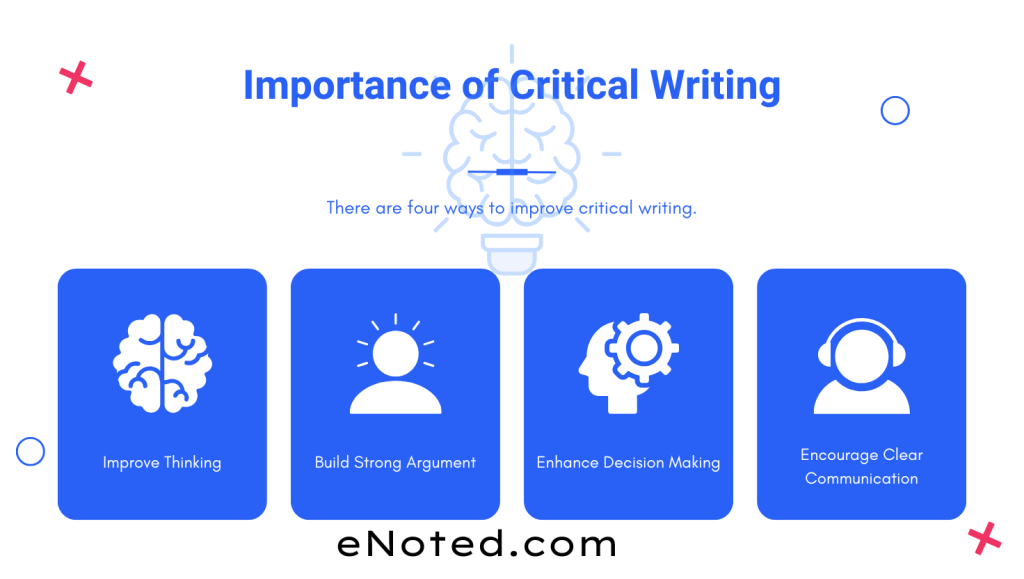Critical writing, also called evaluative writing, is a type of writing that goes beyond simply describing something. Instead, it involves analyzing, interpreting, and forming an opinion about a subject. Critical writing is important in school, work, and everyday life because it helps you understand topics better and communicate your ideas clearly. Whether you’re reviewing a book, evaluating a movie, or writing an essay, critical writing encourages you to think deeply and explain your views with evidence.
What is Critical Writing?
Critical writing isn’t just about repeating facts or summarizing information. It’s about asking questions, exploring different viewpoints, and using evidence to support your opinion. For example, instead of just summarizing the plot of a book, critical writing would look at how the author uses themes, characters, or language to convey their message.
Imagine you’re analyzing a novel. Rather than saying, “The story is about a hero who fights for justice,” critical writing would ask, “How does the author portray the idea of justice? Is the hero’s fight realistic or symbolic?” This approach helps you move from simple understanding to deeper thinking.

Why is Critical Writing Important?
Critical writing has many benefits:
- Improves Thinking Skills: It helps you break down complex ideas and understand them better. This process strengthens your ability to analyze and think critically.
- Builds Strong Arguments: By supporting your ideas with evidence, critical writing helps you present convincing arguments.
- Enhances Decision-Making: When you evaluate options critically, you can make better decisions in school, work, and life.
- Encourages Clear Communication: Critical writing teaches you how to explain your thoughts in a logical and organized way.
What Makes Critical Writing Different?
Critical writing has specific features that set it apart:
- Uses Evidence: Every argument or opinion is supported by facts, examples, or reliable sources.
- Considers Multiple Perspectives: It looks at different viewpoints and weighs their strengths and weaknesses.
- Has a Clear Structure: Critical writing follows a logical order, making it easy for readers to follow the writer’s ideas.
- Stays Objective: While expressing your opinion, critical writing avoids unnecessary bias and focuses on facts.
The Structure of Critical Writing
Critical writing usually follows a simple structure with four main parts:
1. Introduction
Start by introducing the topic and giving some background information. End the introduction with a thesis statement, which clearly explains your overall opinion or argument. For instance, if you’re reviewing a movie, your thesis could be, “This film uses strong visuals and a unique plot, but it struggles with character development.”
2. Summary
Provide a short summary of the subject, whether it’s a book, article, or event. Keep it neutral and focused on the main points. This gives your readers the context they need to understand your critique.
3. Critique
This is the most important part of critical writing. Here, you analyze the strengths and weaknesses of the subject. For example:
- Strengths: “The movie’s use of color and sound creates a powerful emotional impact.”
- Weaknesses: “However, the main character’s motivations are unclear, making it hard to connect with the story.”
Support your opinions with examples, facts, or quotes. Address counterarguments or alternative perspectives to show you’ve thought about the topic from all sides.
4. Conclusion
Summarize your main points and restate your thesis. Offer a final judgment or suggestion, such as, “While the film’s visuals are impressive, it would benefit from stronger character development.”

How to Write Effectively
Here are some tips for writing critically:
1. Understand Your Subject
Before writing, read or watch the material carefully. Highlight key points and take notes. Look for themes, arguments, or patterns that stand out.
2. Develop a Strong Thesis
Your thesis is the main idea of your critique. Make sure it’s clear, specific, and backed up by evidence. For example, instead of saying, “This book is good,” say, “This book’s themes of friendship and loyalty are well-developed, but the pacing is uneven.”
3. Organize Your Ideas
Use an outline to organize your arguments. Start each paragraph with a topic sentence that introduces the main idea. Use transitions to connect your thoughts and guide readers through your essay.
4. Use Evidence
Support your points with examples from the subject or reliable sources. For instance, when critiquing a novel, you might include a quote from the text to illustrate your argument.
5. Consider Other Perspectives
Think about how others might view the subject. Addressing different opinions makes your writing more balanced and credible.
Examples of Critical Writing
1. Analyzing a Play
When reviewing Shakespeare’s Hamlet, you might explore how the theme of revenge reflects the values of the time. You could analyze Hamlet’s internal struggles and use quotes from the play to support your points.
2. Reviewing a Film
In a review of Inception, you could discuss how its nonlinear storytelling enhances its themes of dreams and reality. You might also point out weaknesses, like underdeveloped characters.
3. Evaluating an Idea
In an essay about renewable energy, you could analyze its environmental benefits, economic costs, and implementation challenges, offering a balanced view supported by data.
Common Challenges in Critical Writing
Many students face challenges when writing critically:
- Being Too Descriptive: Focus on analyzing the subject, not just summarizing it.
- Lack of Evidence: Always back up your points with examples, data, or quotes.
- Biased Opinions: Stay objective and avoid overly emotional language.
- Poor Organization: Use clear structure and logical flow to make your arguments easy to follow.
Conclusion
Critical writing is a valuable skill that helps you think deeply and express your ideas clearly. By analyzing subjects, forming opinions, and using evidence, you can create strong and persuasive arguments. Whether reviewing a book, writing an essay, or critiquing an idea, critical writing helps you communicate effectively and understand the world more deeply.

